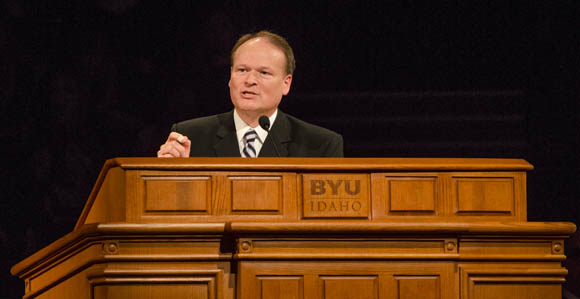Joseph Smith’s Life Shows Weaknesses Can Become Strengths
Contributed By By Kaisey Skipper, Church News contributor

Elder Marcus B. Nash of the Seventy speaks to BYU–Idaho students on November 12.
Article Highlights
- Weakness is given to help us become strong through the Atonement.
- Joseph Smith was made strong in his weaknesses by recognizing them, humbling himself, and asking the Lord for help.
- Develop talents with gratitude, humbly acknowledge weakness, and exercise faith in the Lord.
“We can choose to be defined by our weakness, to be conquered by it, or we can choose to be motivated by it to humbly seek the Master’s guidance and grace, His enabling power.” —Elder Marcus B. Nash of the Seventy
Related Links
REXBURG, IDAHO
Weaknesses can be made strong, Elder Marcus B. Nash of the Seventy said during a campus devotional at Brigham Young University–Idaho on November 12.
Elder Nash used the life experiences of the Prophet Joseph Smith to teach principles relating to making weaknesses become strong.
“Although Joseph Smith was strong of body, mind, and character, he was weak by almost every other earthly measure,” Elder Nash said.
Elder Nash asked students to keep in mind three questions:
· How can weaknesses lead to strength?
· What did Joseph Smith do to facilitate the Lord making him strong out of weakness?
· What does this mean for me?
All three questions, Elder Nash pointed out, relate to the teachings of 2 Nephi 3:13, which says, “And out of weakness he shall be made strong.”
Elder Nash pointed out that Joseph was not well educated and that he became more aware of his weakness when he realized that “he lacked the ability to determine the true church on his own” (see Joseph Smith–History 1:8, 11–18).
In fact, the Prophet described himself as “an obscure boy … who was doomed to the necessity of obtaining a scanty maintenance by his daily labor” (Joseph Smith—History 1:23).
Elder Nash displayed multiple samples of the Prophet’s writing, which included grammatical and spelling errors. Later, he contrasted these with the flowing prose of translated scripture, noting that the latter was completed “by the gift and power of God.”
Elder Nash also noted that “much of Joseph’s work was accomplished in roughly the age span” represented among the students at BYU–Idaho.
“He received the First Vision when 14 years old, the visitation from Moroni at age 17, completed the translation of the Book of Mormon and organized the Church at age 24,” Elder Nash said. “To state the obvious, it was impossible for Joseph to have done all this by his own ability. It was only accomplished because he was strengthened and magnified by the Lord.”
How can weakness lead to strength? To show the purpose of weakness, Elder Nash read Ether 12:27:
“And if men come unto me I will show unto them their weakness. I give unto men weakness that they may be humble; and my grace is sufficient for all men that humble themselves before me; for if they humble themselves before me, and have faith in me, then will I make weak things become strong unto them.”
Elder Nash pointed out that there is a divine purpose in weakness. “Weakness is given to help us become strong in the only way that matters in time and eternity: that is, through the Savior and His Atonement,” he said.
Elder Nash then advised the students to “follow the will of the Father” if they “wish for the Lord to make [them] strong out of [their] weakness.”
What did Joseph Smith do to facilitate the Lord making him strong out of weakness? Elder Nash said that Joseph Smith was able to make his weaknesses strong because he recognized his weakness, humbled himself, and asked the Lord for help.
Elder Nash advised students to follow the Prophet’s pattern by having “thoughtful study of the scriptures, heartfelt prayer, and obedience to the Lord’s will, commandments, and ordinances.”
By living these principles daily, Joseph was “made strong far beyond the desire and aspiration of his youth to simply be clean before the Lord,” Elder Nash said. “Indeed, he became the prophet who did ‘more, save Jesus only, for the salvation of men … than any other’ (D&C 135:3).”
What does this all mean for me? After acknowledging that all have weaknesses, Elder Nash said, “[We] are agents unto ourselves, permitted by divine design to act and not be acted upon” (see 2 Nephi 2:16; D&C 58:27).
“We can choose to be defined by our weakness, to be conquered by it, or we can choose to be motivated by it to humbly seek the Master’s guidance and grace, His enabling power.”
Elder Nash counseled students to “be encouraged by the history of Joseph Smith, prophet, seer, and revelator, and remember the Lord calls upon the weak things of the earth to do His work.”
Elder Nash concluded his devotional address with his testimony, in which he included a “three-part invitation” to make our weaknesses strong before the Lord:
· Develop your talent with gratitude for Him who gave it to you.
· Humbly acknowledge your weakness before Him.
· Steadfastly exercise your faith in Him, seeking His guidance and strength through thoughtful study of the scriptures, heartfelt prayer, and willing obedience to the Lord’s commandments and ordinances.
“Joseph was—despite all that the world and hell could throw against him—made mighty by the power of the Almighty,” Elder Nash said. “And in this same way, you too will be made strong and succeed beyond your brightest, grandest dreams.”
